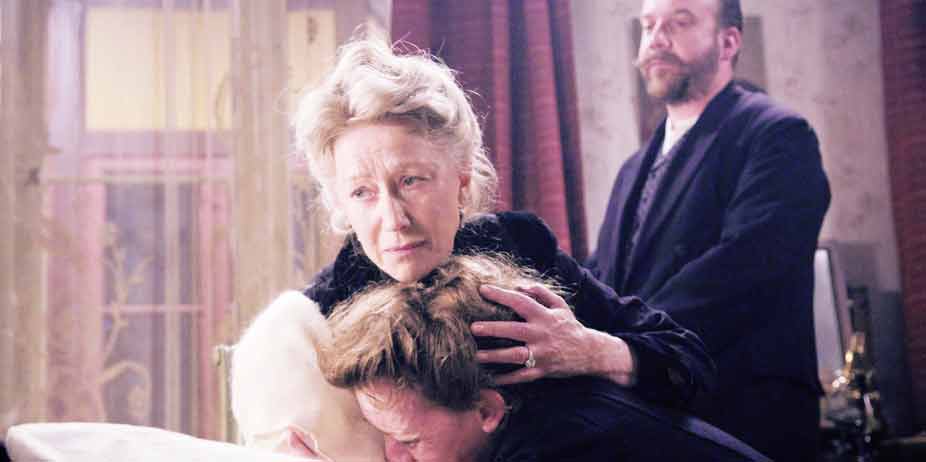
The Last Station
(2009)
Scribbling. The life of a writer is full of it, but what about the lives of journalists, doctors, and secretaries that surround great writers?
The Last Station is based on the final few months of Russian author Leo Tolstoy's life, and his turbulent, deteriorating relationship with his wife. It is a quiet production that earned a number of award nominations and it's not difficult to see why...
Life has become increasingly more difficult for Tolstoy (Christopher Plummer) since he became a successful author. Everyone wants his praise, attention, and guidance, especially as it pertains to his new religious movement that follows a rigid guideline of moral principles. His cynical Russian Orthodox wife Sofya (Helen Mirren) thinks the new faith is rubbish and suspects the leader of the movement, Chertkov (Paul Giamatti), wants to rob her husband of his book rights. Into the midst of this chaos arrives young Valentin (James McAvoy), an aspiring writer who idolizes Tolstoy above all things. Moving into the commune and undertaking the author's personal care, the young man is thrilled to be in the presence of his hero but also finds a sense of compassion for Sofya that her companions do not share, not even her idealistic, emotionally distant daughter (Anne Marie Duff). It is difficult to more than move about the house without being seen by one of the journalists camped out on the front lawn, much less enter a room without overhearing an argument between Tolstoy and his long suffering wife.
And then there is Masha (Kerry Condon), the beautiful girl on the commune who really doesn't seem to put much stock in Tolstoy's old-fashioned ideas of morality. Her aggressiveness with Valentin has the potential to lure him into a forbidden territory known as "love," forever changing his life even as Sofya risks losing her beloved husband to a religious movement. I did not know much about Tolstoy before this film, apart from a handful of events in his life that shaped certain of his novels, but am told that this is a very accurate (at least, as pertains to him and Sofya) representation of the final months in his life. While the story is told from the perspective of the secretary, he is merely a guiding force for other characters to reveal their heartache and frustration -- it is Sofya that gains the audience's greatest compassion, as we watch her world crumble. It's not hard to understand her motivations, either, which in my opinion are not driven by greed but an honest desire to see her husband's works respected. It's difficult not to feel her anguish and pain, or to find a natural villain in the motives of the people that surround her, but none of them are one-dimensional or simply "bad." The undercurrent is a challenge to the audience to discern when life becomes more than just a solitary pursuit, and whether or not you have a right to cause the people you love pain by supporting a higher calling.
Everything about the production value and casting is brilliant. There is an authenticity in the scenery and costumes that is delightful, and the screenplay while sad at certain moments has a delightfully underhanded sense of humor. It's hard not to smile at certain scenes even if they are setting up a more intense exchange of words -- such as Tolstoy coming into the room to find his wife shooting at a portrait of Chertkov after she has found it, again, in the spot where a photograph of them should hang. The acting is tremendous -- Plummer is demure and understated, while Mirren is temperamental and passionate. Her tantrum over dinner should have been enough to earn her another Oscar nomination. McAvoy also delighted me with his repressed, deeply anguished Valentin, who is caught between his compassion and his job requirements. One of his brilliant moments comes after an outburst from Sofya, in which the camera pans over to catch him crouching behind a piece of furniture, forgotten -- and hoping to be overlooked, but his torment is evident. One of the more charming aspects of his personality is that he sneezes whenever he is nervous -- which sometimes gives him away! Unfortunately, in one instance the film falters -- by including sexual content. Without two particular scenes, it would have earned a lower rating and been more accessible and appropriate for all audiences.
Masha has known Valentin for all of two conversations before they break the abstinence rule of the commune. The scene is quite graphic and includes movement, sounds, and breast nudity. We later see her breasts again in a similar, morning-after scene. Elsewhere, Sofya lures her husband into bed with some teasing conversation that involves chickens and roosters (she uses a different word for rooster, which by modern standards implies a double innuendo). Elsewhere, there are a handful of frank conversations about "sexual intercourse" -- Valentin is questioned as to his morals, Masha confesses to having had an adulterous affair with another teacher at a school, Tolstoy muses about his past indiscretions and one girl in particular, and Sofya remarks that her husband gave her a journal of women-filled "exploits" prior to their marriage (this is true -- she married him in spite of his past). Violence is nonexistent apart from a woman waving around a gun, but thematic elements run high -- a woman attempts to drown herself in the pond and collapses after a violent tantrum. There are many loud, angry arguments and insults bandied back and forth. There is one scatological reference.
It's a shame the sexual content taints the film because otherwise it is a fascinating story about principles conflicting with duty. It's a mere glimpse, and a beautifully nuanced one, into the life of one of the most controversial authors of his time.
